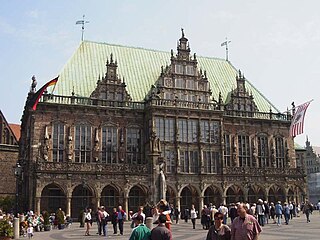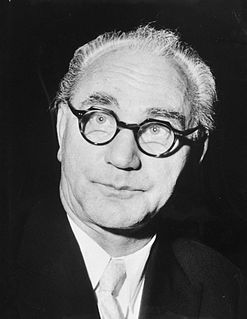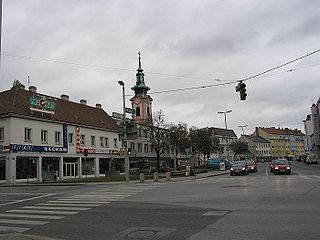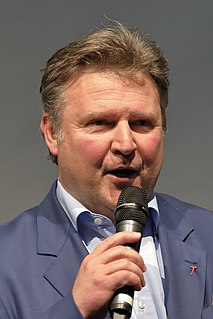Related Research Articles

Vienna is the federal capital and largest city of Austria, and one of the nine states of Austria. Vienna is Austria's primate city, with a population of about 1.9 million, and its cultural, economic, and political centre. It is the 7th-largest city by population within city limits in the European Union. Until the beginning of the 20th century, it was the largest German-speaking city in the world, and before the splitting of the Austro-Hungarian Empire in World War I, the city had 2 million inhabitants. Today, it has the second largest number of German speakers after Berlin. Vienna is host to many major international organizations, including the United Nations and OPEC. The city is located in the eastern part of Austria and is close to the borders of the Czech Republic, Slovakia, and Hungary. These regions work together in a European Centrope border region. Along with nearby Bratislava, Vienna forms a metropolitan region with 3 million inhabitants. In 2001, the city centre was designated a UNESCO World Heritage Site. In July 2017 it was moved to the list of World Heritage in Danger.

Bremen, officially the Free Hanseatic City of Bremen, is the smallest and least populous of Germany's 16 states. It is informally called Land Bremen, although this is sometimes used in official contexts. The state consists of the city of Bremen as well as the small exclave of Bremerhaven in Northern Germany, surrounded by the larger state of Lower Saxony.

Austria is a federal republic made up of nine states, known in German as Länder. Since Land is also the German word for "country", the term Bundesländer is often used instead to avoid ambiguity. The Constitution of Austria uses both terms. Even though English "land" is a cognate, the term (Bundes)land is commonly rendered as "state" or "province" by tradition in English writing.

Karl Lueger was an Austrian politician, mayor of Vienna, and leader and founder of the Austrian Christian Social Party. He is credited with the transformation of the city of Vienna into a modern city. The populist and antisemitic politics of his Christian Social Party are sometimes viewed as a model for Adolf Hitler's Nazism.

Krems an der Donau is a town of 23,992 inhabitants in Austria, in the federal state of Lower Austria. It is the fifth-largest city of Lower Austria and is approximately 70 kilometres west of Vienna. Krems is a city with its own statute, and therefore it is both a municipality and a district.

Karl Josef Seitz was an Austrian politician of the Social Democratic Workers' Party. He served as member of the Imperial Council, President of the National Council and Mayor of Vienna.

Franz Josef Jonas was an Austrian politician. He served as President of Austria, between 1965 and 1974.

Theodor "Teddy" Kollek was an Israeli politician who served as the mayor of Jerusalem from 1965 to 1993, and founder of the Jerusalem Foundation. Kollek was re-elected five times, in 1969, 1973, 1978, 1983 and 1989. After reluctantly running for a seventh term in 1993 at the age of 82, he lost to Likud candidate and future Prime Minister of Israel Ehud Olmert.
The districts of Vienna are the 23 named city sections of Vienna, Austria, which are numbered for easy reference. They were created from 1850 onwards, when the city area was enlarged by the inclusion of surrounding communities. Although they fill a similar role, Vienna's municipal districts are not administrative districts (Bezirke) as defined by the constitution; Vienna is a statutory city and as such is a single administrative district in its entirety.

Michael Häupl served as mayor and governor of Vienna from 7 November 1994 until 24 May 2018. He is a member of the Social Democratic Party of Austria.

Schwechat is a town southeast of Vienna known for the Vienna International Airport and Schwechater beer. The city is home to the refineries of the Austrian national oil company OMV.

Baron Cajetan von Felder was an Austrian lawyer, entomologist and liberal politician. He served as mayor of Vienna from 1868 to 1878.

Leopold GratzCGIH was an Austrian politician.

Heinz-Christian Strache is an Austrian politician serving as the Vice-Chancellor of Austria since 2017. He also has been Minister for the Civil Service and Sport since January 2018 and Chairman of the Freedom Party (FPÖ) since April 2005. He previously served as a member of the National Council from October 2006 until December 2017 and as a member of the Gemeinderat and Landtag of Vienna (2001–2006).
Richard Schmitz was the last Social-Christian mayor of Vienna, Austria.

Vienna City Hall is the seat of local government of Vienna, located on Rathausplatz in the Innere Stadt district. Constructed from 1872 to 1883 in a Neo-Gothic style according to plans designed by Friedrich von Schmidt, it houses the office of the Mayor of Vienna as well as the chambers of the city council and Vienna Landtag diet.
The following is a timeline of the history of the city of Vienna, Austria.

Michael Ludwig is an Austrian politician (SPÖ) and since May 2018 the mayor and governor of Vienna. Since January 2018 he also serves as the chairman of the SPÖ Vienna.

In the Republic of Austria, the municipality is the administrative division encompassing a single village, town, or city. The municipality has corporate status and local self-government on the basis of parliamentary-style representative democracy: a municipal council elected through a form of party-list system enacts municipal laws, a municipal executive board and a mayor appointed by the council are in charge of municipal administration. Austria is currently partitioned into 2,098 municipalities, ranging in population from about fifty to almost two million. There is no unincorporated territory in Austria.
References
| This article about a mayor in Austria is a stub. You can help Wikipedia by expanding it. |